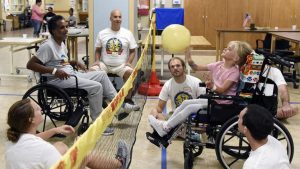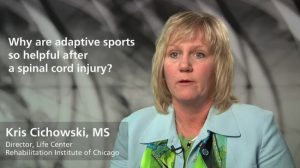For those adapting to disabilities, sports put focus on what’s possible rather than what isn’t
September 18, 2017
The University of Maryland Rehabilitation and Orthopaedic Institute’s annual Adaptive Sports Festival is proof that adaptive sports are more than just games. They play an essential role in the lives of many people with disabilities, which is highlighted in this article from the Baltimore Sun.
 Coming off the basketball court at the University of Maryland Rehabilitation & Orthopaedic Institute in West Baltimore on Saturday afternoon, Derrick Waters wiped a few beads of sweat from his forehead and smiled.
Coming off the basketball court at the University of Maryland Rehabilitation & Orthopaedic Institute in West Baltimore on Saturday afternoon, Derrick Waters wiped a few beads of sweat from his forehead and smiled.
“I still gotta get a lot better at it,” the 38-year-old Owings Mills resident said of wheelchair basketball, “but it’s my favorite.”
Across the parking lot, a group of women and girls, all with some form of physical disability, danced to hip-hop music thumping out of a set of speakers, while a few men with amputated limbs played soccer in the nearby grass. In an adjacent building, others with limited mobility were slipping into a pool in full scuba gear.
All were participating in the institute’s ninth annual Adaptive Sports Festival, an event aimed at showcasing all that is possible for individuals with physical disabilities who want to remain active in sports.
While physical therapy is important, not everyone is inspired by repeating the same exercises over and over in a clinical setting, said Lori Patria, the institute’s director of therapy. Some would rather push themselves to a finish line or strive for a team victory — things that are still very much possible with the right attitude and support.
“When you make therapy meaningful,” Patria said, “you can achieve greater outcomes.”
Known as UM Rehab, the institute provides inpatient rehabilitation services to patients who have been discharged from the Maryland Shock Trauma Center downtown. It also accepts patients from other facilities and by referral from all across the state and region.
In addition to inpatient care, it provides a wide range of year-round programming and rehabilitation services, and helps to sponsor other programming — including sports.
Among the sports offered are basketball, rugby and scuba diving.
The festival aims to get those with new disabilities involved, in part by showing them others who have already benefited, organizers said.
“It’s a good opportunity for the newly injured or the ones with new illnesses with physical disabilities to get out and see folks who have been disabled who are living active lives,” said Mike Henley, a recreational therapist at the institute and chair of its festival committee.
Henley, 36, a resident of Parkville, suffered a spinal cord injury when he was thrown from a car the day after his 18th birthday and has used a wheelchair since. He said that when the newly injured or ill “see happy people who are in wheelchairs and people with maybe worse injuries than them being active again,” it is “inspiring.”
Waters, who is one of the older participants, said it helps to “share our struggles and accomplishments with one another.”
Waters lost the use of his legs at the age of 15 after being shot in the city and suffering a brain injury, he said. It wasn’t easy adapting to his new life at first, he said, but physical therapy helped.
He went on to college and works at the Internal Revenue Service.
Now, with younger shooting victims and others with disabilities he meets, he tries to impart a message that life does not end with the injury, he said.
“Beyond what happened to you, beyond that frustration, just know that there’s still a life beyond, and stuff you can do,” he said.
Henley said he has a similar message. “I tell people, ‘You still have control over two things: your attitude and your work ethic,’ ” he said. “Sports is a great outlet.”
David Kincaid, 55, a former securities trader from Columbia, agreed.
Kincaid said he had his first “attack” of what some doctors have diagnosed as multiple sclerosis in 2010. It left him unbalanced and in need of a cane to walk. He started receiving therapy and looking for ways to become active again.
Last year, Kincaid found the institute’s scuba training program — in partnership with York Divers, out of York, Pa. — and got certified. Last summer he went to Florida to dive, and he now has his eyes set on Hawaii.
He just needs some “adaptive dive buddies” to go with him, and he’ll be off, he said.
“It’s given me a more positive outlook,” he said.

Leave a Reply